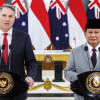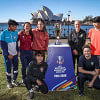Indonesia go Dutch in pursuit of World Cup dreams

An Indonesian team under Dutch colonial rule sailed to France for the 1938 World Cup -- they lost their only game 6-0 and the country has not played at the tournament since.
More than 80 years on, football-mad Indonesia is dreaming of a return, with a large contingent of Netherlands-born players spearheading the charge.
Indonesia are in the decisive third round of Asian qualifying as they attempt to reach the 2026 World Cup in North America.
Recent squads have included as many as 10 Dutch-born players after football officials intensely recruited from the Indonesian diaspora in its former colonial ruler.
"We have our choice to look for quality players," said Football Association of Indonesia committee member Arya Sinulingga.
"FIFA provides that space and from our law it is also possible, so why not?"
Ahead of Friday's home clash with Japan in front of an anticipated 78,000 fans in the capital Jakarta, Indonesia are fifth of the six teams in their qualifying group.
The top two reach the World Cup, with third and fourth going into another stage of qualifying.
Other countries have also naturalised players, but the extent to which Indonesia has done so is striking -- nine of the starting XI in a 2-1 defeat to China last month were born in the Netherlands.
Japan coach Hajime Moriyasu said that the current Indonesia side under South Korean coach Shin Tae-yong is "different, stronger".
"They are a country that has always had a passionate football culture," he said.
"What has strengthened them is that they have naturalised players who mostly play in Europe, and now they have quality players in almost every position."
- Top European leagues -
In the decade before the Covid pandemic, 17 players were naturalised for the Indonesian team.
Since 2020, 15 have made the switch with recruited players having to give up their original passports because Indonesia does not recognise dual citizenship.

They include Justin Hubner, who plays in the reserves for Premier League Wolves, and fellow defender Jay Idzes of Venezia in Italy's Serie A.
The newest recruit is another Dutch-born defender in Kevin Diks, who plays for FC Copenhagen and represented the Netherlands at youth level.
Others play in the top leagues in the Netherlands and Belgium.
There is also striker Rafael Struick, who plays for Australia's Brisbane Roar.
While football is immensely popular in the world's fourth most populous nation, and Indonesia is projected to become a top-five economy by 2050, there has been a lack of investment in the grassroots game.
Indonesia's domestic football has been blighted for years by shaky infrastructure, mismanagement and violence, including a stadium stampede that left more than 130 people dead in 2022.
That lack of investment has been felt at youth level, leading to what some have perceived as the current quick fix.
"The goal is improving quality because, honestly, it must be realised that youth development in Indonesia is not as good as in Europe," said Aun Rahman of Indonesia's Box2box football podcast.
- K-pop comparisons -
Aun said that there is hype surrounding the team and the newly recruited players that he compares to the "Korean pop idolising model".
Most of the young Dutchmen immediately amassed millions of new social media followers after committing themselves to their new country.
With the naturalisation policy so far bringing results on the pitch, Indonesians have happily gone along with it.
When Indonesia played China away, thousands of fans massed outside Gelora Bung Karno stadium in Jakarta to watch a live broadcast on large screens.
Football association chairman Erick Thohir, the billionaire former chairman of Inter Milan, says ticket sales for sell-out home matches involving the national side brought in 20 billion rupiah ($1.27 million) a game.
Another bumper crowd is expected when the Indonesia team, known locally as "Timnas", host Saudi Arabia on Tuesday.
The relative recent success has also seen fans snap up merchandise.
Arya, from the football association, also drew comparisons with the immense popularity of K-pop band BTS.
"If they idolise BTS, what would they buy? BTS products, right?" he said.
"But because they idolise Timnas, who is getting the advantage?
"Of course, Indonesia."

 For all latest news, follow The Daily Star's Google News channel.
For all latest news, follow The Daily Star's Google News channel. 








Comments